Marketing Essentials: Analysis of Unilever's Marketing Report
VerifiedAdded on 2020/11/12
|15
|4534
|304
Report
AI Summary
This report provides a comprehensive analysis of marketing essentials, focusing on the marketing strategies of Unilever. It begins by defining key marketing concepts and outlining the roles and responsibilities of the marketing function, including product, production, marketing, selling, and societal marketing concepts. The report then explores the interrelationship of marketing with other organizational departments such as finance, operations, and human resources, emphasizing the value and importance of marketing within the organizational context. A significant portion of the report compares the marketing mix strategies of Unilever and Nestle, analyzing their approaches to product, price, place, and promotion. Finally, the report presents a basic marketing plan for an organization, incorporating the analysis of market opportunities, target market selection, and the development of a marketing mix. The conclusion emphasizes the significance of effective interrelationships between different functional departments for achieving organizational goals.
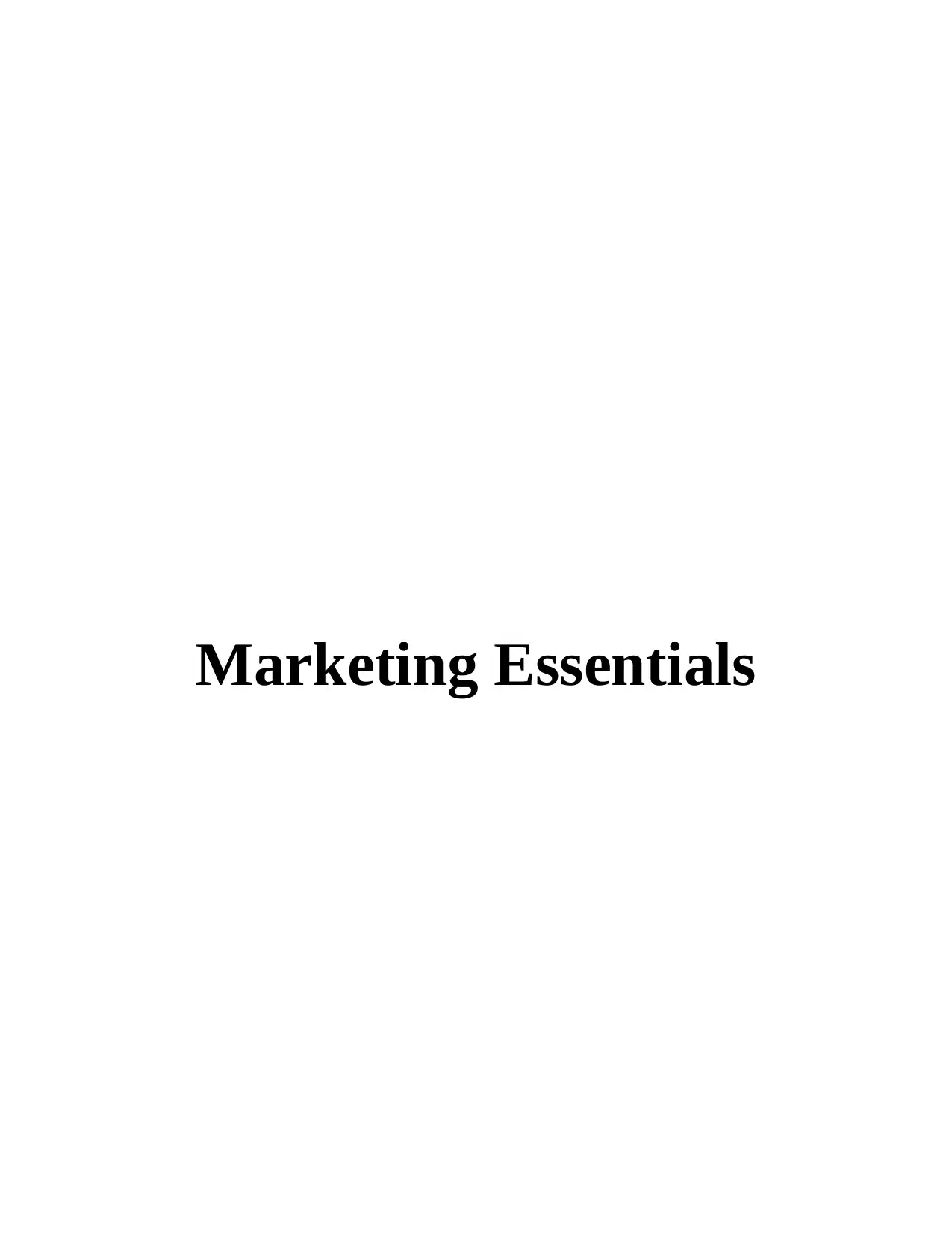
Marketing Essentials
Paraphrase This Document
Need a fresh take? Get an instant paraphrase of this document with our AI Paraphraser
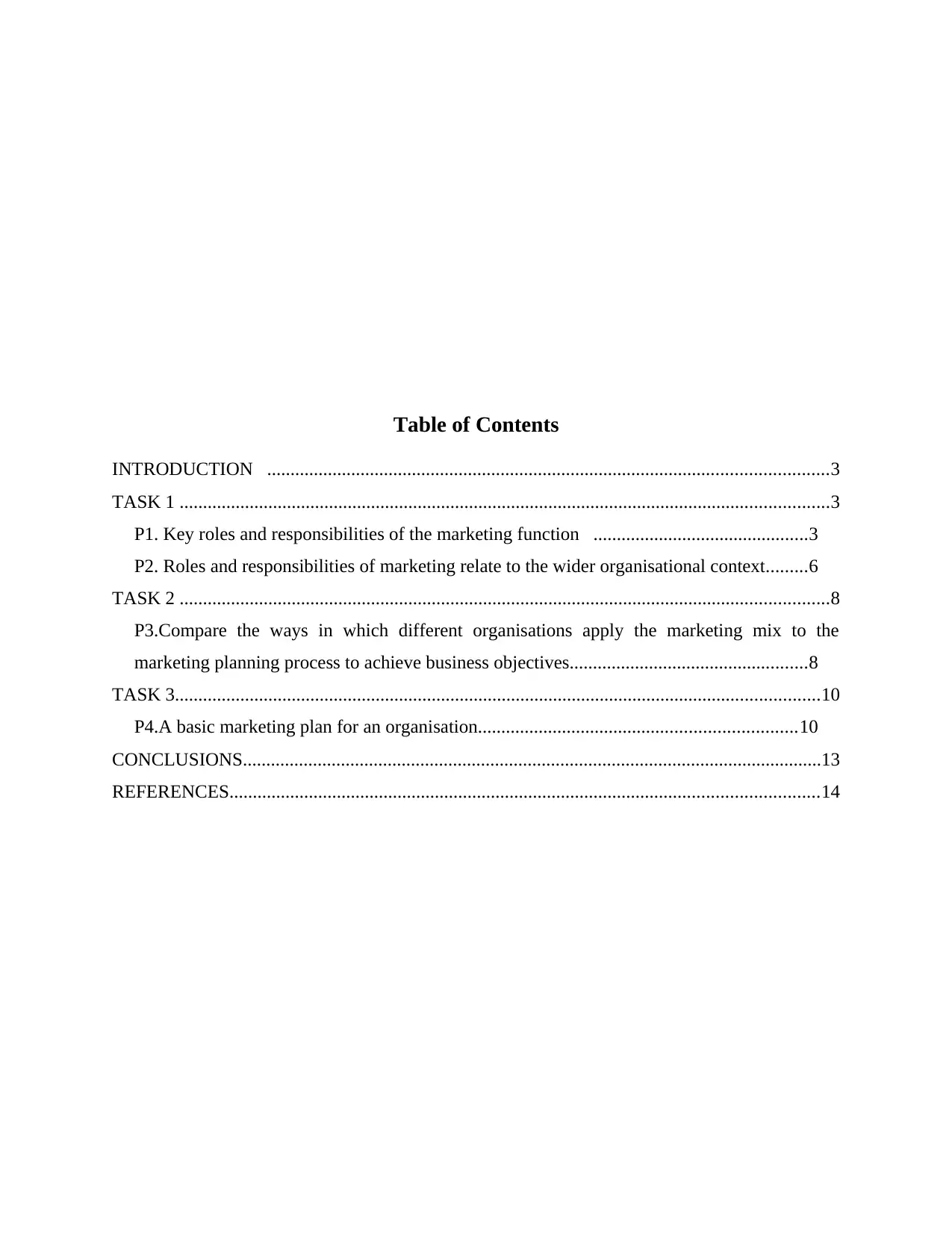
Table of Contents
INTRODUCTION ........................................................................................................................3
TASK 1 ...........................................................................................................................................3
P1. Key roles and responsibilities of the marketing function ..............................................3
P2. Roles and responsibilities of marketing relate to the wider organisational context.........6
TASK 2 ...........................................................................................................................................8
P3.Compare the ways in which different organisations apply the marketing mix to the
marketing planning process to achieve business objectives...................................................8
TASK 3..........................................................................................................................................10
P4.A basic marketing plan for an organisation....................................................................10
CONCLUSIONS............................................................................................................................13
REFERENCES..............................................................................................................................14
INTRODUCTION ........................................................................................................................3
TASK 1 ...........................................................................................................................................3
P1. Key roles and responsibilities of the marketing function ..............................................3
P2. Roles and responsibilities of marketing relate to the wider organisational context.........6
TASK 2 ...........................................................................................................................................8
P3.Compare the ways in which different organisations apply the marketing mix to the
marketing planning process to achieve business objectives...................................................8
TASK 3..........................................................................................................................................10
P4.A basic marketing plan for an organisation....................................................................10
CONCLUSIONS............................................................................................................................13
REFERENCES..............................................................................................................................14
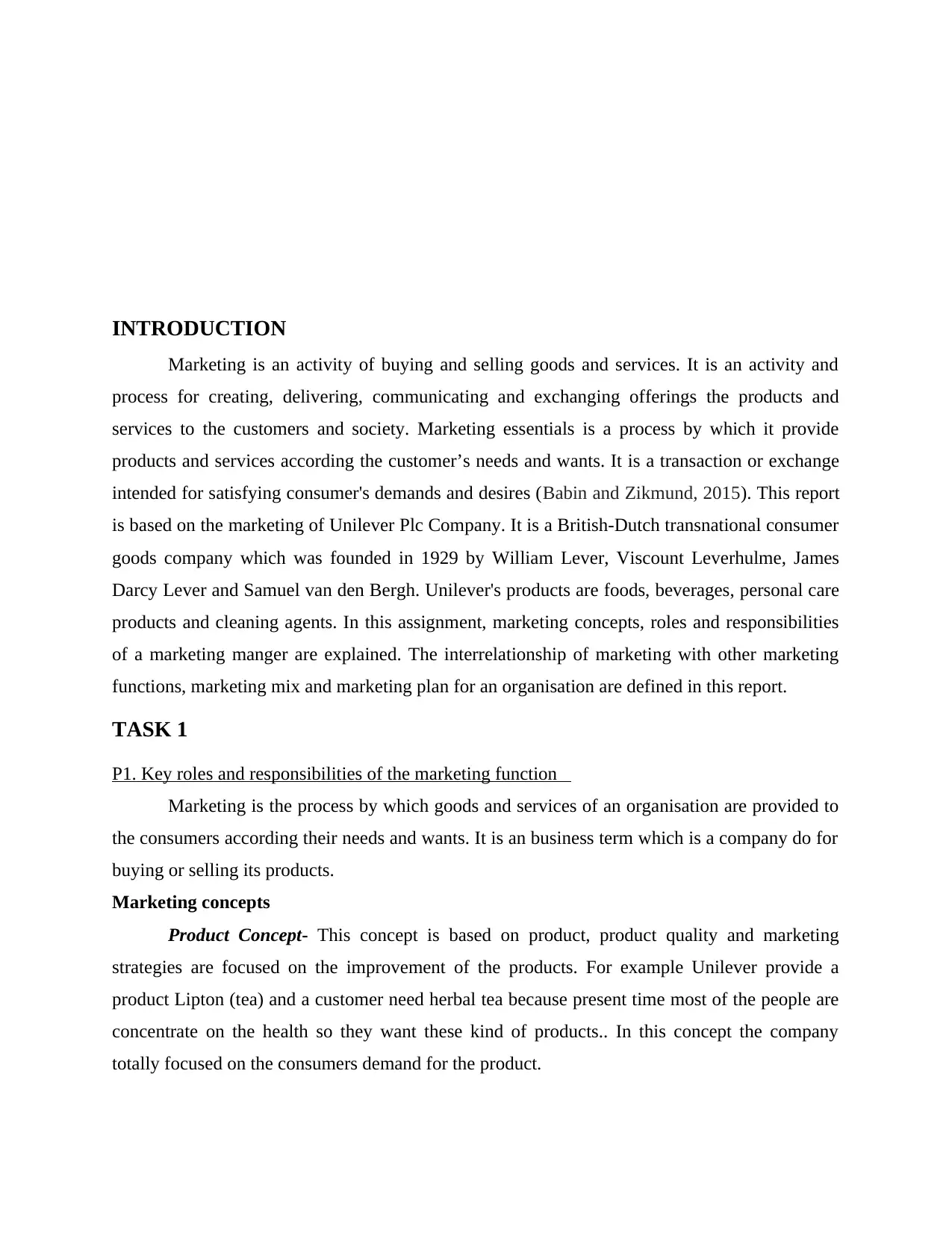
INTRODUCTION
Marketing is an activity of buying and selling goods and services. It is an activity and
process for creating, delivering, communicating and exchanging offerings the products and
services to the customers and society. Marketing essentials is a process by which it provide
products and services according the customer’s needs and wants. It is a transaction or exchange
intended for satisfying consumer's demands and desires (Babin and Zikmund, 2015). This report
is based on the marketing of Unilever Plc Company. It is a British-Dutch transnational consumer
goods company which was founded in 1929 by William Lever, Viscount Leverhulme, James
Darcy Lever and Samuel van den Bergh. Unilever's products are foods, beverages, personal care
products and cleaning agents. In this assignment, marketing concepts, roles and responsibilities
of a marketing manger are explained. The interrelationship of marketing with other marketing
functions, marketing mix and marketing plan for an organisation are defined in this report.
TASK 1
P1. Key roles and responsibilities of the marketing function
Marketing is the process by which goods and services of an organisation are provided to
the consumers according their needs and wants. It is an business term which is a company do for
buying or selling its products.
Marketing concepts
Product Concept- This concept is based on product, product quality and marketing
strategies are focused on the improvement of the products. For example Unilever provide a
product Lipton (tea) and a customer need herbal tea because present time most of the people are
concentrate on the health so they want these kind of products.. In this concept the company
totally focused on the consumers demand for the product.
Marketing is an activity of buying and selling goods and services. It is an activity and
process for creating, delivering, communicating and exchanging offerings the products and
services to the customers and society. Marketing essentials is a process by which it provide
products and services according the customer’s needs and wants. It is a transaction or exchange
intended for satisfying consumer's demands and desires (Babin and Zikmund, 2015). This report
is based on the marketing of Unilever Plc Company. It is a British-Dutch transnational consumer
goods company which was founded in 1929 by William Lever, Viscount Leverhulme, James
Darcy Lever and Samuel van den Bergh. Unilever's products are foods, beverages, personal care
products and cleaning agents. In this assignment, marketing concepts, roles and responsibilities
of a marketing manger are explained. The interrelationship of marketing with other marketing
functions, marketing mix and marketing plan for an organisation are defined in this report.
TASK 1
P1. Key roles and responsibilities of the marketing function
Marketing is the process by which goods and services of an organisation are provided to
the consumers according their needs and wants. It is an business term which is a company do for
buying or selling its products.
Marketing concepts
Product Concept- This concept is based on product, product quality and marketing
strategies are focused on the improvement of the products. For example Unilever provide a
product Lipton (tea) and a customer need herbal tea because present time most of the people are
concentrate on the health so they want these kind of products.. In this concept the company
totally focused on the consumers demand for the product.
⊘ This is a preview!⊘
Do you want full access?
Subscribe today to unlock all pages.

Trusted by 1+ million students worldwide
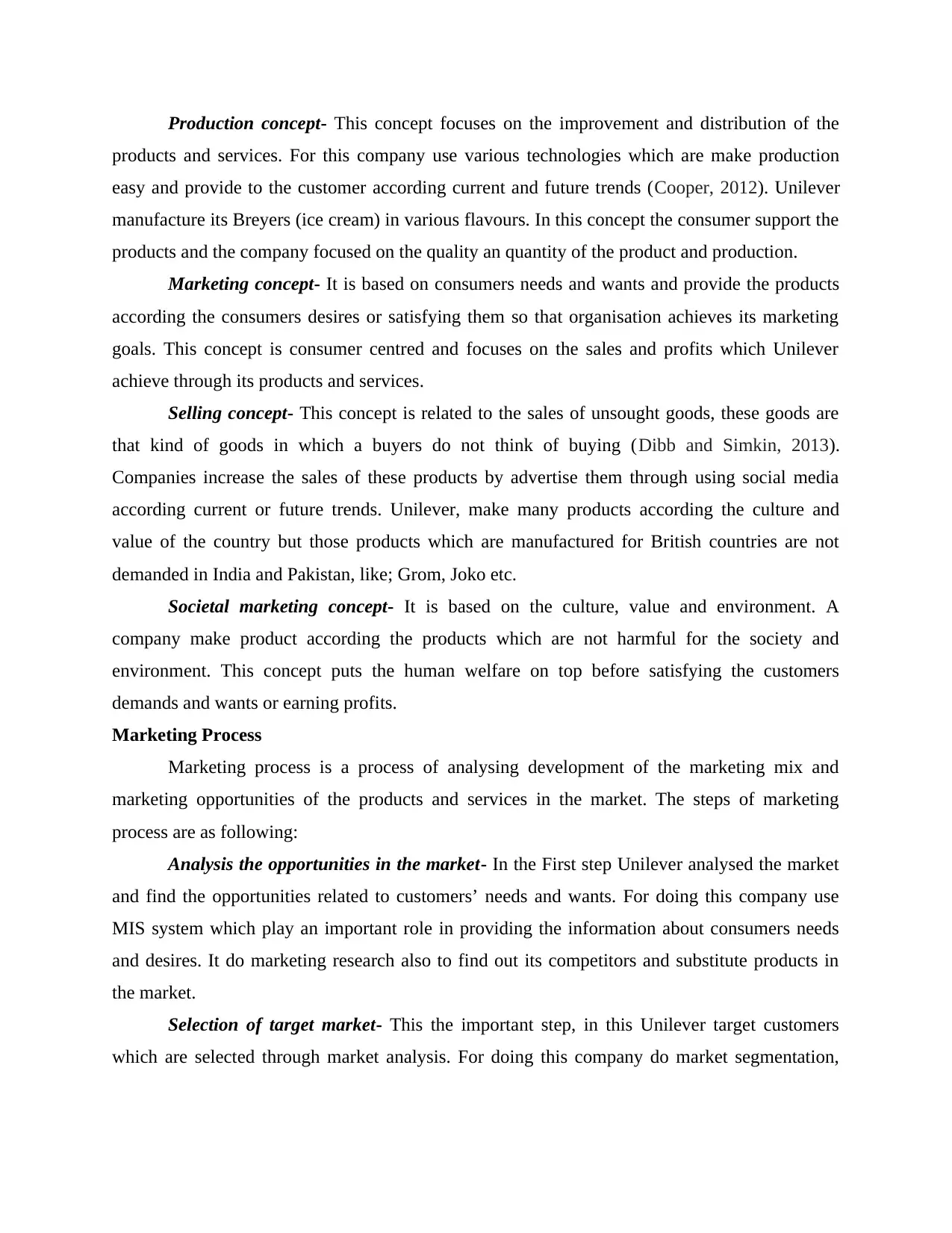
Production concept- This concept focuses on the improvement and distribution of the
products and services. For this company use various technologies which are make production
easy and provide to the customer according current and future trends (Cooper, 2012). Unilever
manufacture its Breyers (ice cream) in various flavours. In this concept the consumer support the
products and the company focused on the quality an quantity of the product and production.
Marketing concept- It is based on consumers needs and wants and provide the products
according the consumers desires or satisfying them so that organisation achieves its marketing
goals. This concept is consumer centred and focuses on the sales and profits which Unilever
achieve through its products and services.
Selling concept- This concept is related to the sales of unsought goods, these goods are
that kind of goods in which a buyers do not think of buying (Dibb and Simkin, 2013).
Companies increase the sales of these products by advertise them through using social media
according current or future trends. Unilever, make many products according the culture and
value of the country but those products which are manufactured for British countries are not
demanded in India and Pakistan, like; Grom, Joko etc.
Societal marketing concept- It is based on the culture, value and environment. A
company make product according the products which are not harmful for the society and
environment. This concept puts the human welfare on top before satisfying the customers
demands and wants or earning profits.
Marketing Process
Marketing process is a process of analysing development of the marketing mix and
marketing opportunities of the products and services in the market. The steps of marketing
process are as following:
Analysis the opportunities in the market- In the First step Unilever analysed the market
and find the opportunities related to customers’ needs and wants. For doing this company use
MIS system which play an important role in providing the information about consumers needs
and desires. It do marketing research also to find out its competitors and substitute products in
the market.
Selection of target market- This the important step, in this Unilever target customers
which are selected through market analysis. For doing this company do market segmentation,
products and services. For this company use various technologies which are make production
easy and provide to the customer according current and future trends (Cooper, 2012). Unilever
manufacture its Breyers (ice cream) in various flavours. In this concept the consumer support the
products and the company focused on the quality an quantity of the product and production.
Marketing concept- It is based on consumers needs and wants and provide the products
according the consumers desires or satisfying them so that organisation achieves its marketing
goals. This concept is consumer centred and focuses on the sales and profits which Unilever
achieve through its products and services.
Selling concept- This concept is related to the sales of unsought goods, these goods are
that kind of goods in which a buyers do not think of buying (Dibb and Simkin, 2013).
Companies increase the sales of these products by advertise them through using social media
according current or future trends. Unilever, make many products according the culture and
value of the country but those products which are manufactured for British countries are not
demanded in India and Pakistan, like; Grom, Joko etc.
Societal marketing concept- It is based on the culture, value and environment. A
company make product according the products which are not harmful for the society and
environment. This concept puts the human welfare on top before satisfying the customers
demands and wants or earning profits.
Marketing Process
Marketing process is a process of analysing development of the marketing mix and
marketing opportunities of the products and services in the market. The steps of marketing
process are as following:
Analysis the opportunities in the market- In the First step Unilever analysed the market
and find the opportunities related to customers’ needs and wants. For doing this company use
MIS system which play an important role in providing the information about consumers needs
and desires. It do marketing research also to find out its competitors and substitute products in
the market.
Selection of target market- This the important step, in this Unilever target customers
which are selected through market analysis. For doing this company do market segmentation,
Paraphrase This Document
Need a fresh take? Get an instant paraphrase of this document with our AI Paraphraser
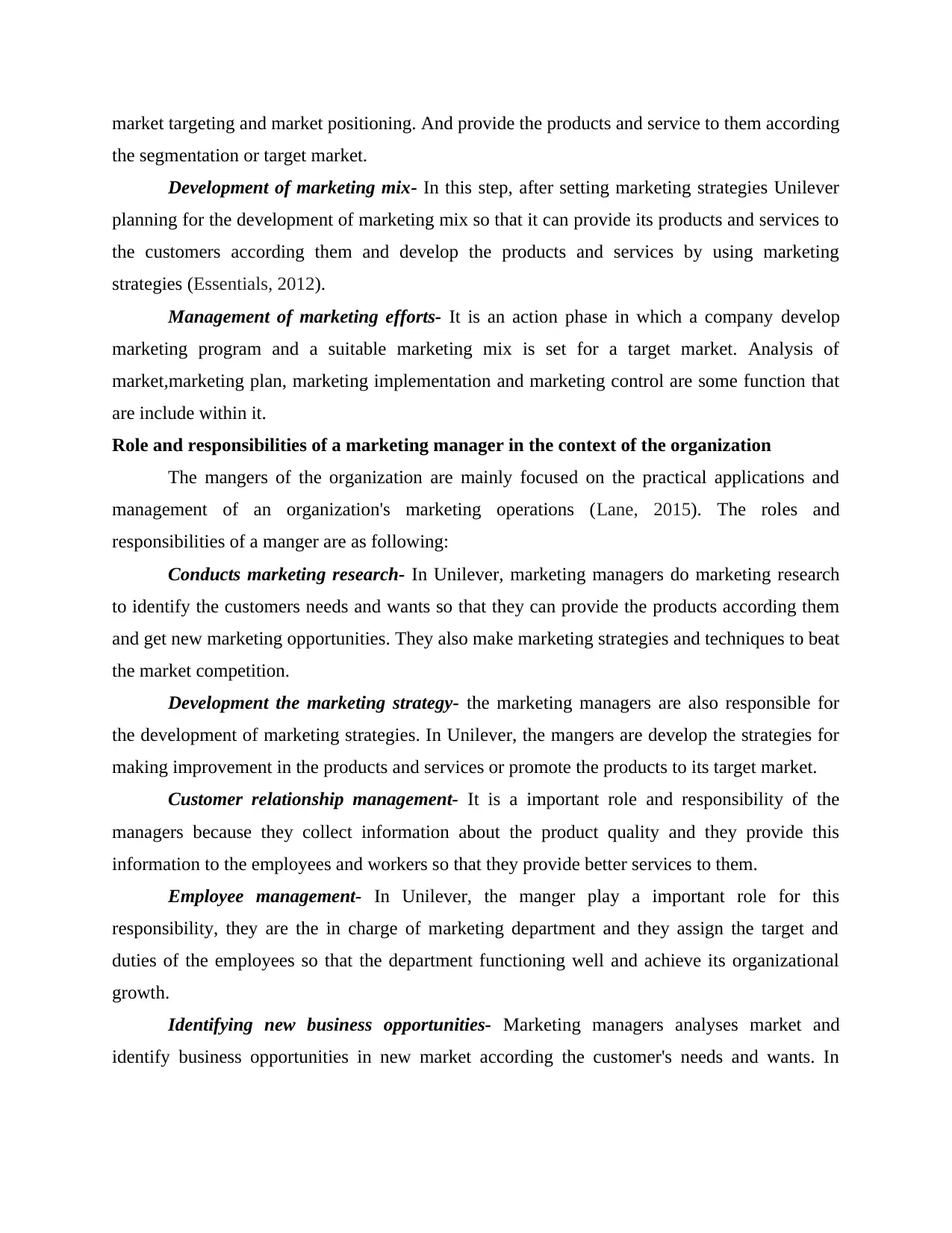
market targeting and market positioning. And provide the products and service to them according
the segmentation or target market.
Development of marketing mix- In this step, after setting marketing strategies Unilever
planning for the development of marketing mix so that it can provide its products and services to
the customers according them and develop the products and services by using marketing
strategies (Essentials, 2012).
Management of marketing efforts- It is an action phase in which a company develop
marketing program and a suitable marketing mix is set for a target market. Analysis of
market,marketing plan, marketing implementation and marketing control are some function that
are include within it.
Role and responsibilities of a marketing manager in the context of the organization
The mangers of the organization are mainly focused on the practical applications and
management of an organization's marketing operations (Lane, 2015). The roles and
responsibilities of a manger are as following:
Conducts marketing research- In Unilever, marketing managers do marketing research
to identify the customers needs and wants so that they can provide the products according them
and get new marketing opportunities. They also make marketing strategies and techniques to beat
the market competition.
Development the marketing strategy- the marketing managers are also responsible for
the development of marketing strategies. In Unilever, the mangers are develop the strategies for
making improvement in the products and services or promote the products to its target market.
Customer relationship management- It is a important role and responsibility of the
managers because they collect information about the product quality and they provide this
information to the employees and workers so that they provide better services to them.
Employee management- In Unilever, the manger play a important role for this
responsibility, they are the in charge of marketing department and they assign the target and
duties of the employees so that the department functioning well and achieve its organizational
growth.
Identifying new business opportunities- Marketing managers analyses market and
identify business opportunities in new market according the customer's needs and wants. In
the segmentation or target market.
Development of marketing mix- In this step, after setting marketing strategies Unilever
planning for the development of marketing mix so that it can provide its products and services to
the customers according them and develop the products and services by using marketing
strategies (Essentials, 2012).
Management of marketing efforts- It is an action phase in which a company develop
marketing program and a suitable marketing mix is set for a target market. Analysis of
market,marketing plan, marketing implementation and marketing control are some function that
are include within it.
Role and responsibilities of a marketing manager in the context of the organization
The mangers of the organization are mainly focused on the practical applications and
management of an organization's marketing operations (Lane, 2015). The roles and
responsibilities of a manger are as following:
Conducts marketing research- In Unilever, marketing managers do marketing research
to identify the customers needs and wants so that they can provide the products according them
and get new marketing opportunities. They also make marketing strategies and techniques to beat
the market competition.
Development the marketing strategy- the marketing managers are also responsible for
the development of marketing strategies. In Unilever, the mangers are develop the strategies for
making improvement in the products and services or promote the products to its target market.
Customer relationship management- It is a important role and responsibility of the
managers because they collect information about the product quality and they provide this
information to the employees and workers so that they provide better services to them.
Employee management- In Unilever, the manger play a important role for this
responsibility, they are the in charge of marketing department and they assign the target and
duties of the employees so that the department functioning well and achieve its organizational
growth.
Identifying new business opportunities- Marketing managers analyses market and
identify business opportunities in new market according the customer's needs and wants. In
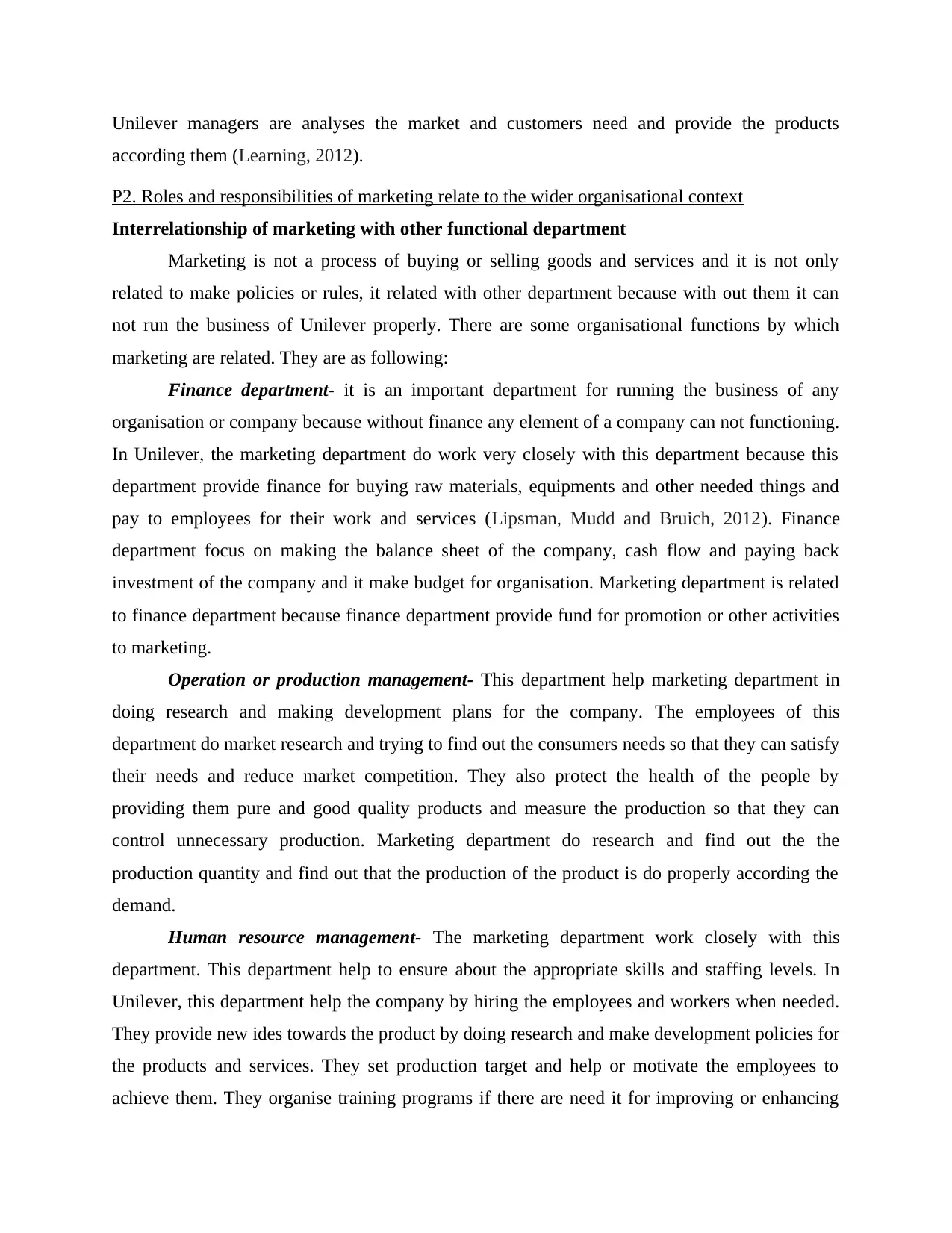
Unilever managers are analyses the market and customers need and provide the products
according them (Learning, 2012).
P2. Roles and responsibilities of marketing relate to the wider organisational context
Interrelationship of marketing with other functional department
Marketing is not a process of buying or selling goods and services and it is not only
related to make policies or rules, it related with other department because with out them it can
not run the business of Unilever properly. There are some organisational functions by which
marketing are related. They are as following:
Finance department- it is an important department for running the business of any
organisation or company because without finance any element of a company can not functioning.
In Unilever, the marketing department do work very closely with this department because this
department provide finance for buying raw materials, equipments and other needed things and
pay to employees for their work and services (Lipsman, Mudd and Bruich, 2012). Finance
department focus on making the balance sheet of the company, cash flow and paying back
investment of the company and it make budget for organisation. Marketing department is related
to finance department because finance department provide fund for promotion or other activities
to marketing.
Operation or production management- This department help marketing department in
doing research and making development plans for the company. The employees of this
department do market research and trying to find out the consumers needs so that they can satisfy
their needs and reduce market competition. They also protect the health of the people by
providing them pure and good quality products and measure the production so that they can
control unnecessary production. Marketing department do research and find out the the
production quantity and find out that the production of the product is do properly according the
demand.
Human resource management- The marketing department work closely with this
department. This department help to ensure about the appropriate skills and staffing levels. In
Unilever, this department help the company by hiring the employees and workers when needed.
They provide new ides towards the product by doing research and make development policies for
the products and services. They set production target and help or motivate the employees to
achieve them. They organise training programs if there are need it for improving or enhancing
according them (Learning, 2012).
P2. Roles and responsibilities of marketing relate to the wider organisational context
Interrelationship of marketing with other functional department
Marketing is not a process of buying or selling goods and services and it is not only
related to make policies or rules, it related with other department because with out them it can
not run the business of Unilever properly. There are some organisational functions by which
marketing are related. They are as following:
Finance department- it is an important department for running the business of any
organisation or company because without finance any element of a company can not functioning.
In Unilever, the marketing department do work very closely with this department because this
department provide finance for buying raw materials, equipments and other needed things and
pay to employees for their work and services (Lipsman, Mudd and Bruich, 2012). Finance
department focus on making the balance sheet of the company, cash flow and paying back
investment of the company and it make budget for organisation. Marketing department is related
to finance department because finance department provide fund for promotion or other activities
to marketing.
Operation or production management- This department help marketing department in
doing research and making development plans for the company. The employees of this
department do market research and trying to find out the consumers needs so that they can satisfy
their needs and reduce market competition. They also protect the health of the people by
providing them pure and good quality products and measure the production so that they can
control unnecessary production. Marketing department do research and find out the the
production quantity and find out that the production of the product is do properly according the
demand.
Human resource management- The marketing department work closely with this
department. This department help to ensure about the appropriate skills and staffing levels. In
Unilever, this department help the company by hiring the employees and workers when needed.
They provide new ides towards the product by doing research and make development policies for
the products and services. They set production target and help or motivate the employees to
achieve them. They organise training programs if there are need it for improving or enhancing
⊘ This is a preview!⊘
Do you want full access?
Subscribe today to unlock all pages.

Trusted by 1+ million students worldwide
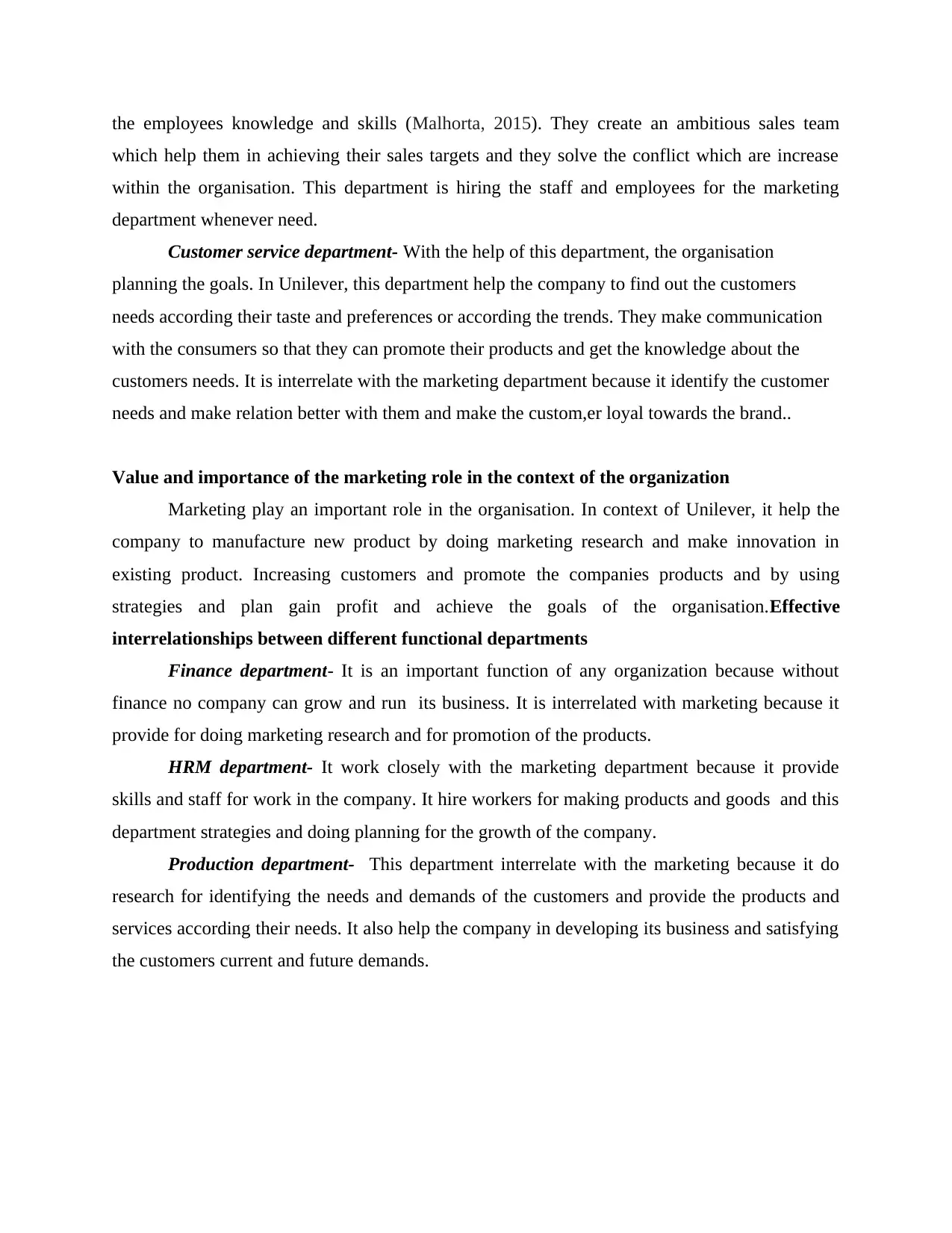
the employees knowledge and skills (Malhorta, 2015). They create an ambitious sales team
which help them in achieving their sales targets and they solve the conflict which are increase
within the organisation. This department is hiring the staff and employees for the marketing
department whenever need.
Customer service department- With the help of this department, the organisation
planning the goals. In Unilever, this department help the company to find out the customers
needs according their taste and preferences or according the trends. They make communication
with the consumers so that they can promote their products and get the knowledge about the
customers needs. It is interrelate with the marketing department because it identify the customer
needs and make relation better with them and make the custom,er loyal towards the brand..
Value and importance of the marketing role in the context of the organization
Marketing play an important role in the organisation. In context of Unilever, it help the
company to manufacture new product by doing marketing research and make innovation in
existing product. Increasing customers and promote the companies products and by using
strategies and plan gain profit and achieve the goals of the organisation.Effective
interrelationships between different functional departments
Finance department- It is an important function of any organization because without
finance no company can grow and run its business. It is interrelated with marketing because it
provide for doing marketing research and for promotion of the products.
HRM department- It work closely with the marketing department because it provide
skills and staff for work in the company. It hire workers for making products and goods and this
department strategies and doing planning for the growth of the company.
Production department- This department interrelate with the marketing because it do
research for identifying the needs and demands of the customers and provide the products and
services according their needs. It also help the company in developing its business and satisfying
the customers current and future demands.
which help them in achieving their sales targets and they solve the conflict which are increase
within the organisation. This department is hiring the staff and employees for the marketing
department whenever need.
Customer service department- With the help of this department, the organisation
planning the goals. In Unilever, this department help the company to find out the customers
needs according their taste and preferences or according the trends. They make communication
with the consumers so that they can promote their products and get the knowledge about the
customers needs. It is interrelate with the marketing department because it identify the customer
needs and make relation better with them and make the custom,er loyal towards the brand..
Value and importance of the marketing role in the context of the organization
Marketing play an important role in the organisation. In context of Unilever, it help the
company to manufacture new product by doing marketing research and make innovation in
existing product. Increasing customers and promote the companies products and by using
strategies and plan gain profit and achieve the goals of the organisation.Effective
interrelationships between different functional departments
Finance department- It is an important function of any organization because without
finance no company can grow and run its business. It is interrelated with marketing because it
provide for doing marketing research and for promotion of the products.
HRM department- It work closely with the marketing department because it provide
skills and staff for work in the company. It hire workers for making products and goods and this
department strategies and doing planning for the growth of the company.
Production department- This department interrelate with the marketing because it do
research for identifying the needs and demands of the customers and provide the products and
services according their needs. It also help the company in developing its business and satisfying
the customers current and future demands.
Paraphrase This Document
Need a fresh take? Get an instant paraphrase of this document with our AI Paraphraser
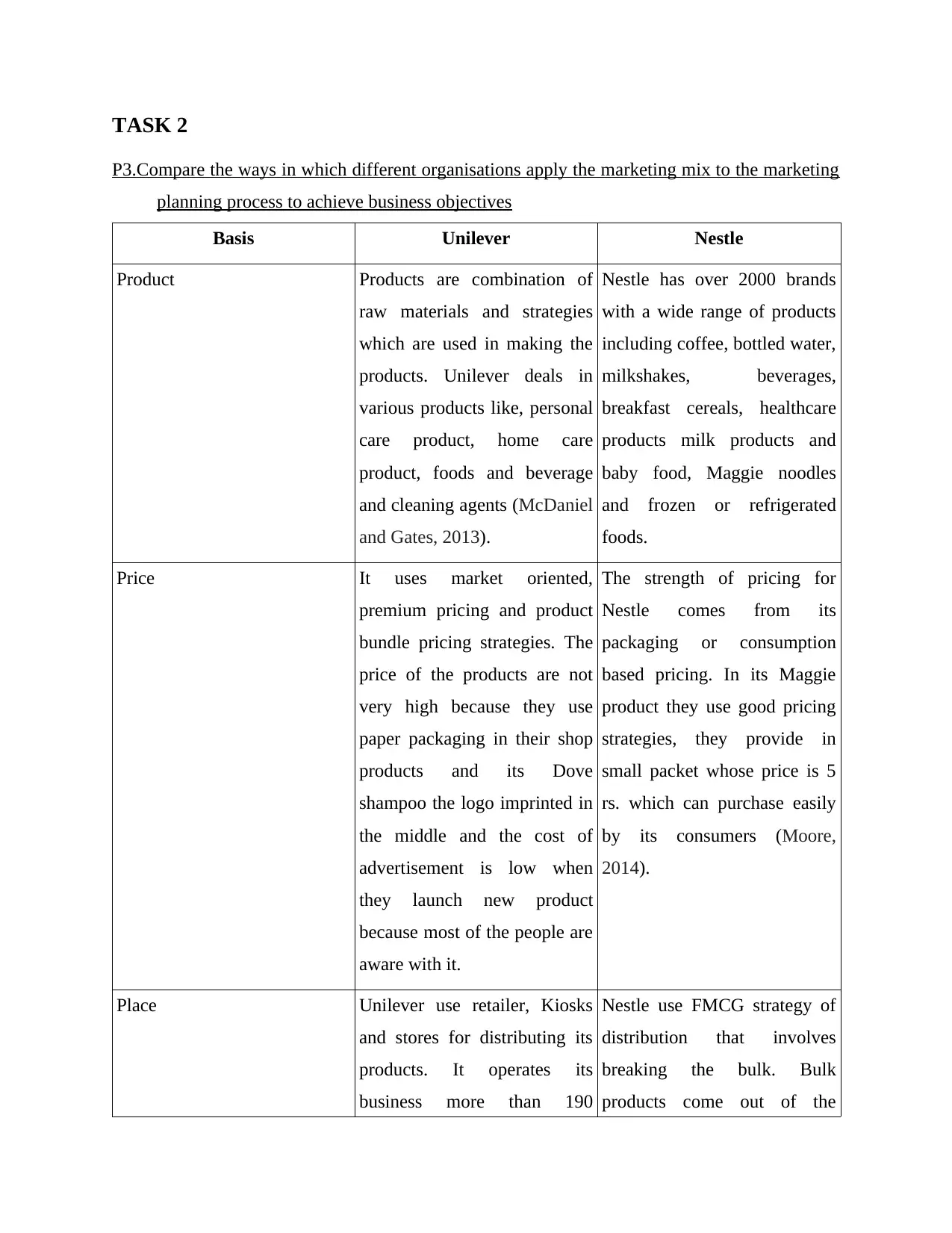
TASK 2
P3.Compare the ways in which different organisations apply the marketing mix to the marketing
planning process to achieve business objectives
Basis Unilever Nestle
Product Products are combination of
raw materials and strategies
which are used in making the
products. Unilever deals in
various products like, personal
care product, home care
product, foods and beverage
and cleaning agents (McDaniel
and Gates, 2013).
Nestle has over 2000 brands
with a wide range of products
including coffee, bottled water,
milkshakes, beverages,
breakfast cereals, healthcare
products milk products and
baby food, Maggie noodles
and frozen or refrigerated
foods.
Price It uses market oriented,
premium pricing and product
bundle pricing strategies. The
price of the products are not
very high because they use
paper packaging in their shop
products and its Dove
shampoo the logo imprinted in
the middle and the cost of
advertisement is low when
they launch new product
because most of the people are
aware with it.
The strength of pricing for
Nestle comes from its
packaging or consumption
based pricing. In its Maggie
product they use good pricing
strategies, they provide in
small packet whose price is 5
rs. which can purchase easily
by its consumers (Moore,
2014).
Place Unilever use retailer, Kiosks
and stores for distributing its
products. It operates its
business more than 190
Nestle use FMCG strategy of
distribution that involves
breaking the bulk. Bulk
products come out of the
P3.Compare the ways in which different organisations apply the marketing mix to the marketing
planning process to achieve business objectives
Basis Unilever Nestle
Product Products are combination of
raw materials and strategies
which are used in making the
products. Unilever deals in
various products like, personal
care product, home care
product, foods and beverage
and cleaning agents (McDaniel
and Gates, 2013).
Nestle has over 2000 brands
with a wide range of products
including coffee, bottled water,
milkshakes, beverages,
breakfast cereals, healthcare
products milk products and
baby food, Maggie noodles
and frozen or refrigerated
foods.
Price It uses market oriented,
premium pricing and product
bundle pricing strategies. The
price of the products are not
very high because they use
paper packaging in their shop
products and its Dove
shampoo the logo imprinted in
the middle and the cost of
advertisement is low when
they launch new product
because most of the people are
aware with it.
The strength of pricing for
Nestle comes from its
packaging or consumption
based pricing. In its Maggie
product they use good pricing
strategies, they provide in
small packet whose price is 5
rs. which can purchase easily
by its consumers (Moore,
2014).
Place Unilever use retailer, Kiosks
and stores for distributing its
products. It operates its
business more than 190
Nestle use FMCG strategy of
distribution that involves
breaking the bulk. Bulk
products come out of the
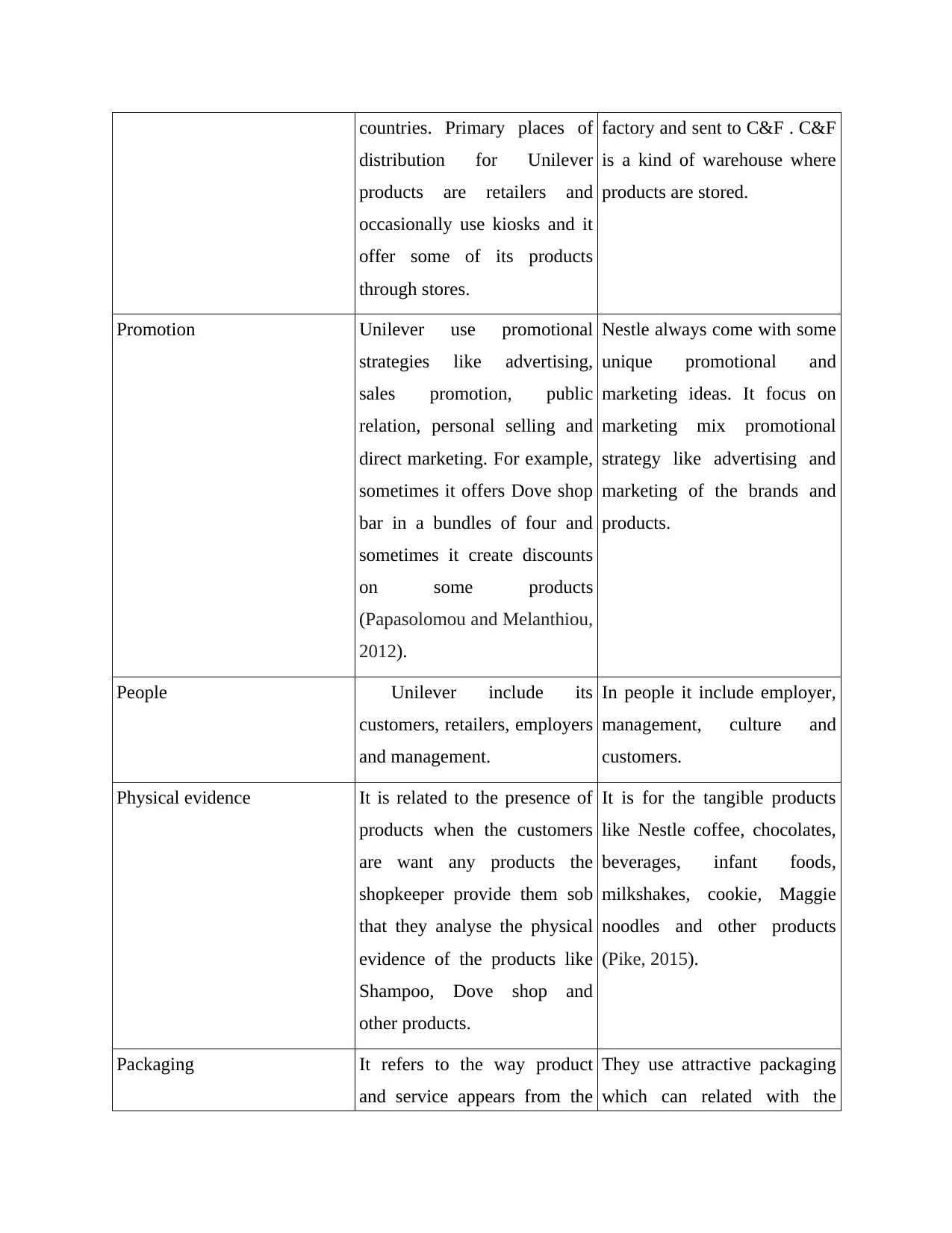
countries. Primary places of
distribution for Unilever
products are retailers and
occasionally use kiosks and it
offer some of its products
through stores.
factory and sent to C&F . C&F
is a kind of warehouse where
products are stored.
Promotion Unilever use promotional
strategies like advertising,
sales promotion, public
relation, personal selling and
direct marketing. For example,
sometimes it offers Dove shop
bar in a bundles of four and
sometimes it create discounts
on some products
(Papasolomou and Melanthiou,
2012).
Nestle always come with some
unique promotional and
marketing ideas. It focus on
marketing mix promotional
strategy like advertising and
marketing of the brands and
products.
People Unilever include its
customers, retailers, employers
and management.
In people it include employer,
management, culture and
customers.
Physical evidence It is related to the presence of
products when the customers
are want any products the
shopkeeper provide them sob
that they analyse the physical
evidence of the products like
Shampoo, Dove shop and
other products.
It is for the tangible products
like Nestle coffee, chocolates,
beverages, infant foods,
milkshakes, cookie, Maggie
noodles and other products
(Pike, 2015).
Packaging It refers to the way product
and service appears from the
They use attractive packaging
which can related with the
distribution for Unilever
products are retailers and
occasionally use kiosks and it
offer some of its products
through stores.
factory and sent to C&F . C&F
is a kind of warehouse where
products are stored.
Promotion Unilever use promotional
strategies like advertising,
sales promotion, public
relation, personal selling and
direct marketing. For example,
sometimes it offers Dove shop
bar in a bundles of four and
sometimes it create discounts
on some products
(Papasolomou and Melanthiou,
2012).
Nestle always come with some
unique promotional and
marketing ideas. It focus on
marketing mix promotional
strategy like advertising and
marketing of the brands and
products.
People Unilever include its
customers, retailers, employers
and management.
In people it include employer,
management, culture and
customers.
Physical evidence It is related to the presence of
products when the customers
are want any products the
shopkeeper provide them sob
that they analyse the physical
evidence of the products like
Shampoo, Dove shop and
other products.
It is for the tangible products
like Nestle coffee, chocolates,
beverages, infant foods,
milkshakes, cookie, Maggie
noodles and other products
(Pike, 2015).
Packaging It refers to the way product
and service appears from the
They use attractive packaging
which can related with the
⊘ This is a preview!⊘
Do you want full access?
Subscribe today to unlock all pages.

Trusted by 1+ million students worldwide
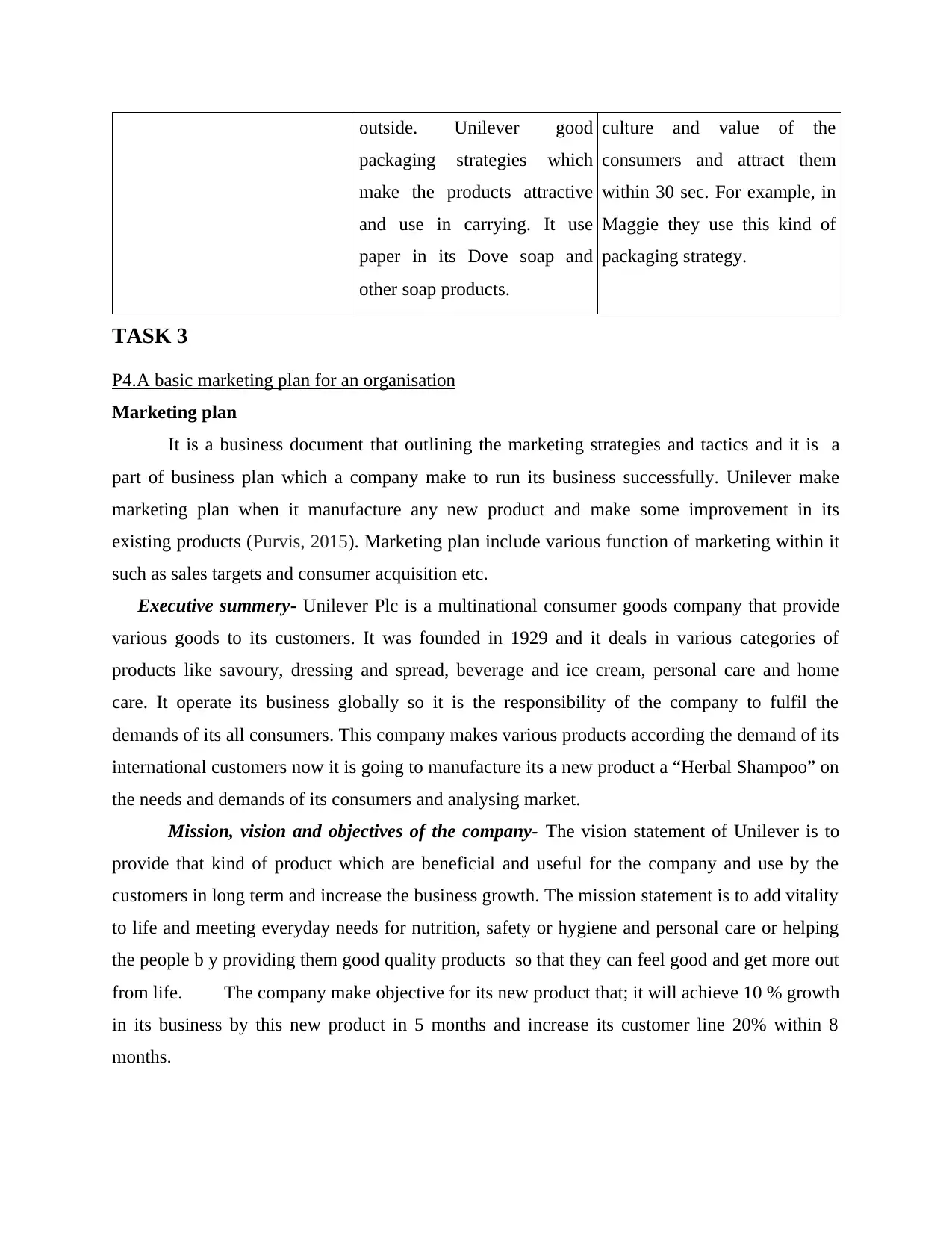
outside. Unilever good
packaging strategies which
make the products attractive
and use in carrying. It use
paper in its Dove soap and
other soap products.
culture and value of the
consumers and attract them
within 30 sec. For example, in
Maggie they use this kind of
packaging strategy.
TASK 3
P4.A basic marketing plan for an organisation
Marketing plan
It is a business document that outlining the marketing strategies and tactics and it is a
part of business plan which a company make to run its business successfully. Unilever make
marketing plan when it manufacture any new product and make some improvement in its
existing products (Purvis, 2015). Marketing plan include various function of marketing within it
such as sales targets and consumer acquisition etc.
Executive summery- Unilever Plc is a multinational consumer goods company that provide
various goods to its customers. It was founded in 1929 and it deals in various categories of
products like savoury, dressing and spread, beverage and ice cream, personal care and home
care. It operate its business globally so it is the responsibility of the company to fulfil the
demands of its all consumers. This company makes various products according the demand of its
international customers now it is going to manufacture its a new product a “Herbal Shampoo” on
the needs and demands of its consumers and analysing market.
Mission, vision and objectives of the company- The vision statement of Unilever is to
provide that kind of product which are beneficial and useful for the company and use by the
customers in long term and increase the business growth. The mission statement is to add vitality
to life and meeting everyday needs for nutrition, safety or hygiene and personal care or helping
the people b y providing them good quality products so that they can feel good and get more out
from life. The company make objective for its new product that; it will achieve 10 % growth
in its business by this new product in 5 months and increase its customer line 20% within 8
months.
packaging strategies which
make the products attractive
and use in carrying. It use
paper in its Dove soap and
other soap products.
culture and value of the
consumers and attract them
within 30 sec. For example, in
Maggie they use this kind of
packaging strategy.
TASK 3
P4.A basic marketing plan for an organisation
Marketing plan
It is a business document that outlining the marketing strategies and tactics and it is a
part of business plan which a company make to run its business successfully. Unilever make
marketing plan when it manufacture any new product and make some improvement in its
existing products (Purvis, 2015). Marketing plan include various function of marketing within it
such as sales targets and consumer acquisition etc.
Executive summery- Unilever Plc is a multinational consumer goods company that provide
various goods to its customers. It was founded in 1929 and it deals in various categories of
products like savoury, dressing and spread, beverage and ice cream, personal care and home
care. It operate its business globally so it is the responsibility of the company to fulfil the
demands of its all consumers. This company makes various products according the demand of its
international customers now it is going to manufacture its a new product a “Herbal Shampoo” on
the needs and demands of its consumers and analysing market.
Mission, vision and objectives of the company- The vision statement of Unilever is to
provide that kind of product which are beneficial and useful for the company and use by the
customers in long term and increase the business growth. The mission statement is to add vitality
to life and meeting everyday needs for nutrition, safety or hygiene and personal care or helping
the people b y providing them good quality products so that they can feel good and get more out
from life. The company make objective for its new product that; it will achieve 10 % growth
in its business by this new product in 5 months and increase its customer line 20% within 8
months.
Paraphrase This Document
Need a fresh take? Get an instant paraphrase of this document with our AI Paraphraser
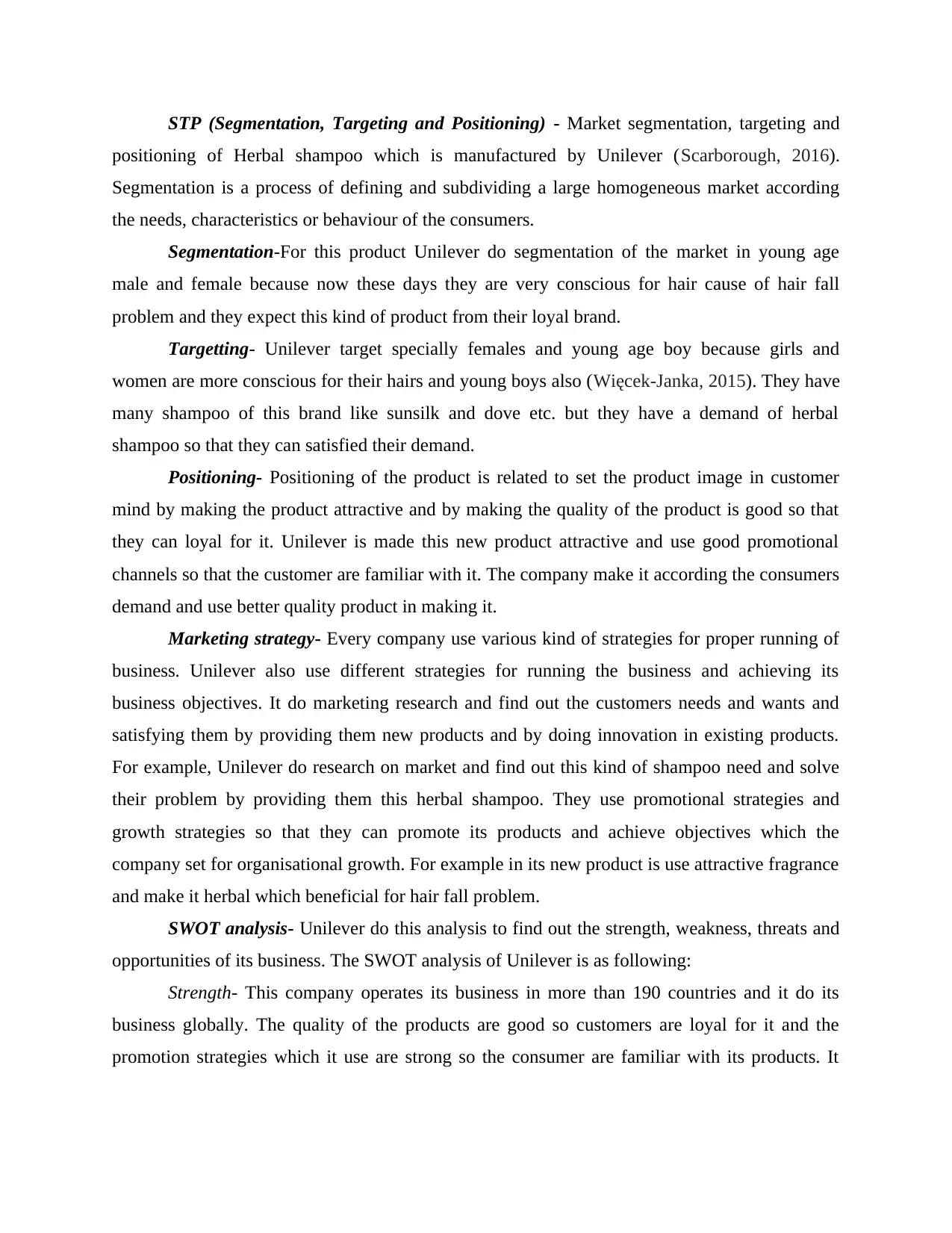
STP (Segmentation, Targeting and Positioning) - Market segmentation, targeting and
positioning of Herbal shampoo which is manufactured by Unilever (Scarborough, 2016).
Segmentation is a process of defining and subdividing a large homogeneous market according
the needs, characteristics or behaviour of the consumers.
Segmentation-For this product Unilever do segmentation of the market in young age
male and female because now these days they are very conscious for hair cause of hair fall
problem and they expect this kind of product from their loyal brand.
Targetting- Unilever target specially females and young age boy because girls and
women are more conscious for their hairs and young boys also (Więcek-Janka, 2015). They have
many shampoo of this brand like sunsilk and dove etc. but they have a demand of herbal
shampoo so that they can satisfied their demand.
Positioning- Positioning of the product is related to set the product image in customer
mind by making the product attractive and by making the quality of the product is good so that
they can loyal for it. Unilever is made this new product attractive and use good promotional
channels so that the customer are familiar with it. The company make it according the consumers
demand and use better quality product in making it.
Marketing strategy- Every company use various kind of strategies for proper running of
business. Unilever also use different strategies for running the business and achieving its
business objectives. It do marketing research and find out the customers needs and wants and
satisfying them by providing them new products and by doing innovation in existing products.
For example, Unilever do research on market and find out this kind of shampoo need and solve
their problem by providing them this herbal shampoo. They use promotional strategies and
growth strategies so that they can promote its products and achieve objectives which the
company set for organisational growth. For example in its new product is use attractive fragrance
and make it herbal which beneficial for hair fall problem.
SWOT analysis- Unilever do this analysis to find out the strength, weakness, threats and
opportunities of its business. The SWOT analysis of Unilever is as following:
Strength- This company operates its business in more than 190 countries and it do its
business globally. The quality of the products are good so customers are loyal for it and the
promotion strategies which it use are strong so the consumer are familiar with its products. It
positioning of Herbal shampoo which is manufactured by Unilever (Scarborough, 2016).
Segmentation is a process of defining and subdividing a large homogeneous market according
the needs, characteristics or behaviour of the consumers.
Segmentation-For this product Unilever do segmentation of the market in young age
male and female because now these days they are very conscious for hair cause of hair fall
problem and they expect this kind of product from their loyal brand.
Targetting- Unilever target specially females and young age boy because girls and
women are more conscious for their hairs and young boys also (Więcek-Janka, 2015). They have
many shampoo of this brand like sunsilk and dove etc. but they have a demand of herbal
shampoo so that they can satisfied their demand.
Positioning- Positioning of the product is related to set the product image in customer
mind by making the product attractive and by making the quality of the product is good so that
they can loyal for it. Unilever is made this new product attractive and use good promotional
channels so that the customer are familiar with it. The company make it according the consumers
demand and use better quality product in making it.
Marketing strategy- Every company use various kind of strategies for proper running of
business. Unilever also use different strategies for running the business and achieving its
business objectives. It do marketing research and find out the customers needs and wants and
satisfying them by providing them new products and by doing innovation in existing products.
For example, Unilever do research on market and find out this kind of shampoo need and solve
their problem by providing them this herbal shampoo. They use promotional strategies and
growth strategies so that they can promote its products and achieve objectives which the
company set for organisational growth. For example in its new product is use attractive fragrance
and make it herbal which beneficial for hair fall problem.
SWOT analysis- Unilever do this analysis to find out the strength, weakness, threats and
opportunities of its business. The SWOT analysis of Unilever is as following:
Strength- This company operates its business in more than 190 countries and it do its
business globally. The quality of the products are good so customers are loyal for it and the
promotion strategies which it use are strong so the consumer are familiar with its products. It
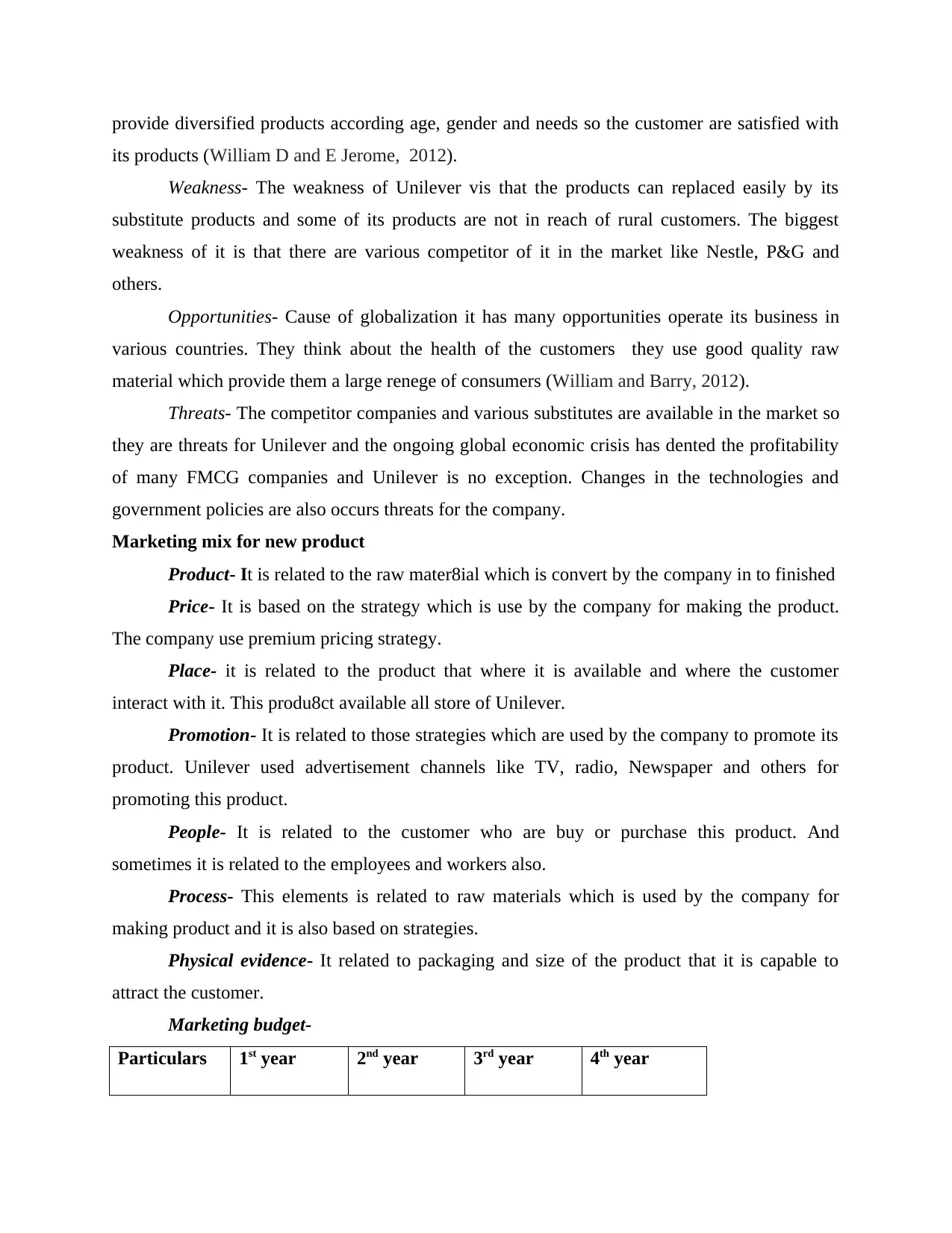
provide diversified products according age, gender and needs so the customer are satisfied with
its products (William D and E Jerome, 2012).
Weakness- The weakness of Unilever vis that the products can replaced easily by its
substitute products and some of its products are not in reach of rural customers. The biggest
weakness of it is that there are various competitor of it in the market like Nestle, P&G and
others.
Opportunities- Cause of globalization it has many opportunities operate its business in
various countries. They think about the health of the customers they use good quality raw
material which provide them a large renege of consumers (William and Barry, 2012).
Threats- The competitor companies and various substitutes are available in the market so
they are threats for Unilever and the ongoing global economic crisis has dented the profitability
of many FMCG companies and Unilever is no exception. Changes in the technologies and
government policies are also occurs threats for the company.
Marketing mix for new product
Product- It is related to the raw mater8ial which is convert by the company in to finished
Price- It is based on the strategy which is use by the company for making the product.
The company use premium pricing strategy.
Place- it is related to the product that where it is available and where the customer
interact with it. This produ8ct available all store of Unilever.
Promotion- It is related to those strategies which are used by the company to promote its
product. Unilever used advertisement channels like TV, radio, Newspaper and others for
promoting this product.
People- It is related to the customer who are buy or purchase this product. And
sometimes it is related to the employees and workers also.
Process- This elements is related to raw materials which is used by the company for
making product and it is also based on strategies.
Physical evidence- It related to packaging and size of the product that it is capable to
attract the customer.
Marketing budget-
Particulars 1st year 2nd year 3rd year 4th year
its products (William D and E Jerome, 2012).
Weakness- The weakness of Unilever vis that the products can replaced easily by its
substitute products and some of its products are not in reach of rural customers. The biggest
weakness of it is that there are various competitor of it in the market like Nestle, P&G and
others.
Opportunities- Cause of globalization it has many opportunities operate its business in
various countries. They think about the health of the customers they use good quality raw
material which provide them a large renege of consumers (William and Barry, 2012).
Threats- The competitor companies and various substitutes are available in the market so
they are threats for Unilever and the ongoing global economic crisis has dented the profitability
of many FMCG companies and Unilever is no exception. Changes in the technologies and
government policies are also occurs threats for the company.
Marketing mix for new product
Product- It is related to the raw mater8ial which is convert by the company in to finished
Price- It is based on the strategy which is use by the company for making the product.
The company use premium pricing strategy.
Place- it is related to the product that where it is available and where the customer
interact with it. This produ8ct available all store of Unilever.
Promotion- It is related to those strategies which are used by the company to promote its
product. Unilever used advertisement channels like TV, radio, Newspaper and others for
promoting this product.
People- It is related to the customer who are buy or purchase this product. And
sometimes it is related to the employees and workers also.
Process- This elements is related to raw materials which is used by the company for
making product and it is also based on strategies.
Physical evidence- It related to packaging and size of the product that it is capable to
attract the customer.
Marketing budget-
Particulars 1st year 2nd year 3rd year 4th year
⊘ This is a preview!⊘
Do you want full access?
Subscribe today to unlock all pages.

Trusted by 1+ million students worldwide
1 out of 15
Related Documents
Your All-in-One AI-Powered Toolkit for Academic Success.
+13062052269
info@desklib.com
Available 24*7 on WhatsApp / Email
![[object Object]](/_next/static/media/star-bottom.7253800d.svg)
Unlock your academic potential
Copyright © 2020–2026 A2Z Services. All Rights Reserved. Developed and managed by ZUCOL.




